| |
 |
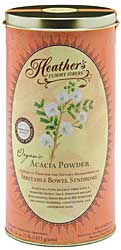
Tummy Fiber For IBS!
Certified Organic
Acacia Senegal
Tummy Fiber
The prebiotic 100% soluble fiber that relieves both diarrhea and constipation!
In this Issue...
Food & Recipes
Special Events
Rx News & Research
Ask Heather
About Us
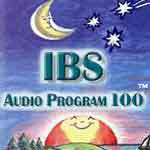
Gut-directed hypnosis is one of the most effective ways to help relieve all IBS symptoms! Results can last more than 5 years.


Fennel Tummy Tea for
IBS Bloating & Gas
Fennel has anti-spasmodic properties and it stimulates the production of gastric juices. Fennel tea is the best for relieving bloating and gas!

Get the IBS Diet Kit!
With Eating for IBS, plus organic fennel tea for bloating and gas, plus peppermint caps to prevent spasms and pain.
Take control of your IBS!

Get stable now ~
and stay that way!
Did you miss the latest
IBS newsletter and
Strawberry Shortcake?
Past issues
are posted here!
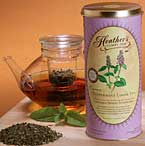
Peppermint Tea for
IBS Pain &
Spasms
Peppermint is a smooth muscle relaxant and has pain-killing properties. Our Tummy Tea is large leaf with a high volatile oil content - much stronger than tea bags!

The IBS Starter Kit!
Learn every way possible to successfully manage your symptoms!
With the First Year: IBS, an essential guide, plus Eating for IBS, plus Acacia Tummy Fiber to start stabilizing immediately!
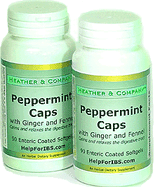
Try Peppermint Caps
Peppermint Caps are the best for abdominal spasms, cramps and pain!
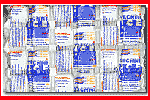
Heat Therapy for
IBS
Hot packs can help prevent stress-related attacks!
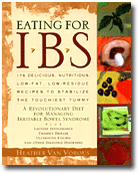
Delicious Recipes
for IBS!
Learn how to eat well and feel better

|
 |
|
| |

Did your email mangle this newsletter? Copy and paste this address into your browser window:
http://www.helpforibs.com/news/newsletter/bluecorn060904.html or click here to see it online.
June 9, 2004
This week ~ Soy, bloating, gas, & Irritable Bowel Syndrome
Hello to everyone -
This week we have a wealth of new digestive health research findings, an IBS Symposium, plus a fabulous recipe for Blueberry Nutmeg Cornbread - enjoy!
Best Wishes,
Heather Van Vorous
Note: Did a friend send you this newsletter? Sign up here for your own free subscription.

Blueberry Nutmeg Cornbread
Makes one small 9 x 5" loaf or 12 muffins
1 1/3 C all-purpose white flour
2/3 C finely ground yellow cornmeal (if you're in the UK, it's called polenta)
1 T baking powder
1/4 t salt
1/2 t cinnamon
1/2 t nutmeg
2 organic egg whites
4 T canola or safflower oil
1/2 C honey
1/2 t vanilla extract
1/2 C soy or rice milk mixed with 1/2 t apple cider vinegar
1 C fresh blueberries, chopped
1 t granulated sugar
Preheat oven to 350F (or 400F for muffins). Spray loaf pan or muffin tins with cooking oil spray and set aside.
In a large bowl sift then whisk together flour, cornmeal, baking powder, salt, cinnamon, and nutmeg. In a small bowl whisk the egg whites with the oil, then whisk in the honey, soy milk/vinegar mixture, and vanilla. Fold chopped blueberries into wet ingredients.
Add the wet ingredients to the dry ingredients and stir gently just until blended. Spoon into loaf pan or muffin tins and sprinkle top of loaf or muffins with sugar. Bake until golden and well-risen, and a toothpick comes out clean, about 50 minutes for a loaf or 18-22 minutes for muffins. Cool on rack. Eat and enjoy!
For hundreds of other delicious IBS recipes, come visit the IBS Recipe Board.
Are you just learning how to eat for IBS? A little intimidated at the thought of special IBS recipes? Not quite sure just what makes these recipes special in the first place? Don't worry! Come see
the IBS Diet pages, and find the answers to all your questions.
 Symposium for IBS Patients on Saturday, June 12th in North Carolina
Symposium for IBS Patients on Saturday, June 12th in North Carolina
The 2004 IBS Patient Symposium will be held at the William and Ida Friday Center at UNC in Chapel Hill, North Carolina, on Saturday, June 12. The symposium is titled "Understanding Irritable Bowel Syndrome (IBS) and Other Gastrointestinal Disorders", and is hosted by the UNC Center for Functional GI and Motility Disorders. It will provide an opportunity to learn about diagnosis, tests, and treatment options of the disorder, explore the role of diet, nutrition, gender, and hormones on IBS, and understand the pain of IBS through cutting edge research on brain imaging.
Attendees will acquire a set of tools for symptom management and explore the benefits of alternative treatments, as well as learn about other available resources. Participants will also have the opportunity to select a break out session most related to their symptoms, which will be facilitated by Center faculty.
 Doctors' Biases Affect Treatment of IBS
Doctors' Biases Affect Treatment of IBS
Doctors' stereotypes about certain diseases may keep patients from receiving effective treatment, according to a new study in the British Medical Journal. Researchers in London gathered 46 general practitioners to discuss treating chronic fatigue syndrome and irritable bowel syndrome. The study's authors say they chose these conditions because both have complex, poorly understood causes and these patients often have symptoms that are difficult to characterize.
The doctors admit they tend to view patients with CFS as having undesirable traits, such as a weaker work ethic or a refusal to play the "sick role," meaning they are seen as not making every effort to get better as quickly as possible. On the other hand, doctors view patients with IBS in a more positive light, giving them credit for "battling through it" or rarely missing work because of the condition.
Previous research has indicated that mental health interventions may be effective for patients with both chronic fatigue syndrome and irritable bowel syndrome who do not respond to symptom management by their primary care doctor. The authors of this study conclude many physicians say they do not consider a referral to a mental health provider because they are unfamiliar with these interventions or they think they're either unnecessary or unavailable. The researchers suggest these set of beliefs are keeping patients from receiving effective treatment.
Check here for more
information...
Benefits of Cannabis in IBS and Fibromyalgia
This study examines the concept of clinical endocannabinoid deficiency (CECD), and the prospect that it could underlie the pathophysiology of fibromyalgia, irritable bowel syndrome, and other functional conditions alleviated by clinical cannabis. Fibromyalgia is now conceived as a central sensitization state with secondary hyperalgesia. Cannabinoids have similarly demonstrated the ability to block spinal, peripheral and gastrointestinal mechanisms that promote pain in headache, fibromyalgia, IBS and related disorders. The past and potential clinical utility of cannabis-based medicines in their treatment is discussed, as are further suggestions for experimental investigation of CECD via CSF examination and neuro-imaging. Conclusion: Migraine, fibromyalgia, IBS and related conditions display common clinical, biochemical and pathophysiological patterns that suggest an underlying clinical endocannabinoid deficiency that may be suitably treated with cannabinoid medicines.
Check here for more
information...
Bad News for Low-Carb Dieters
Two new studies published in the May 18, 2004, Annals of Internal Medicine provide bad news for low-carb dieters, say doctors for the Physicians Committee for Responsible Medicine. The first, conducted at Duke University, showed that "bad" (LDL) cholesterol levels rose significantly in 30 percent of low-carbohydrate dieters. The second, conducted at the Philadelphia Veterans Affairs Medical Center, showed that weight lost during low-carb dieting started to return after six months.
Normally, weight loss causes cholesterol levels to fall. However, some low-carb dieters have experienced the opposite effect - significant increases of cholesterol levels. In the Duke University study, two study participants dropped out because of high levels of LDL cholesterol: One had an increase in LDL cholesterol from 182 mg/dl to 219 mg/dl in four weeks; the second had an increase from 184 mg/dl to 283 mg/dl in three months. Normal levels are < 100 mg/dl. A third participant developed chest pain and was subsequently diagnosed with coronary heart disease. In all, 45 people followed the low-carb diet for 6 months, but 30 percent of them had an LDL cholesterol increase of more than 10 percent.
In the Philadelphia study, low-carb dieters lost substantial amounts of weight over the first six months. But after that point, the average weight began to climb so that weight loss after one year (11.2 pounds) was not significantly better than that seen with other diets. Two study participants on the low-carb diet died, one from hyperosmolar coma five months into the study, and the second from severe ischemic cardiomyopathy ten months into the study.
"This new evidence confirms that levels of "bad" cholesterol worsen in a substantial number of low-carbohydrate dieters," said PCRM resident Neal D. Barnard, M.D. "And the supposedly dramatic benefits of the diet do not hold up over the long term." A 2003 study conducted at the University of Pennsylvania showed that low-carb dieters began to regain lost weight after six months. The new results confirm these findings.
PCRM is urging the Secretary of the Department of Health and Human Services, Tommy Thompson, to convene a panel to investigate the potential adverse effects of low-carbohydrate diets on cholesterol levels, as well as on calcium losses, another problem observed in recent low-carbohydrate diet studies.
Check here for more
information...
Carbonated Soft Drinks Linked to Rise in Esophageal Cancer
Researchers at Tata Memorial Hospital in India have found a strong correlation between the rise in per capita consumption of carbonated soft drinks (CSD) in the past 20 years and the increasing rates of esophageal cancer (ACE) in the United States. Based on available data on diet changes in America from the U.S. Department of Agriculture, per capita consumption of CSD rose by more than 450 percent during the past half-century, from 10.8 gallons in 1946 to 49.2 gallons in 2000. At the same time, in the last 25 years, incidence rates of ACE have risen by more than 570 percent in American white males and continue to increase.
Researchers found published data for a strong biological basis to explain the increased dose and duration of esophageal exposure to acid: CSD drinking causes gastric distension that triggers reflux. Consumption of 350 milliliters of CSD per day (approximately one can of soda) corresponds to 53.5 minutes of pH less than four and 53 gallons per year translates to 32,100 more minutes of acid exposure per year.
Countries with per capita CSD of more than 20 gallons have seen a rising trend of ACE cases. "The surprisingly strong correlation demonstrates the impact of diet patterns on health trends," said Mohandas Mallath, M.D., lead author on the study. "As the rates may continue to rise for another 20 years, we believe that more epidemiological studies are urgently required to establish the true association."
Check here for more
information...
Natural History of Irritable Bowel Syndrome
Background: The natural history of irritable bowel syndrome is unclear, including the likelihood that these patients will be diagnosed with an alternative organic or functional gastrointestinal disorder. Understanding the stability of an irritable bowel syndrome diagnosis may limit repeated diagnostic evaluation among these patients.
Methods: The inclusion criteria included observational longitudinal studies of clinic-based samples of adult patients with irritable bowel syndrome. Only studies published in the English language in full manuscript form were included. Literature searches, selection and review of eligible articles, and data abstraction were performed in a duplicate, independent manner.
Results: Fourteen studies met study selection criteria. In six studies with relevant information, 2-5% of irritable bowel syndrome patients were diagnosed with an alternative organic GI disorder after 6 months to 6 years of follow-up. Long-term follow-up indicated that 2-18% of patients developed worse irritable bowel syndrome symptoms, approximately 30-50% of patients had unchanged symptoms, and the rest either improved or had symptoms disappear. Prior surgery (one study), higher somatic scores (one study), higher baseline anxiety (two studies), depression scores (one study) were predictive of worsening of symptoms during long-term follow-up.
Conclusions: Irritable bowel syndrome, a chronic disorder, is a stable diagnosis. Once initial investigations are negative, fewer than 5% are diagnosed with an alternative organic GI disorder. Repeated diagnostic evaluations of patients with recurrent or persistent symptoms similar to their baseline symptoms are not warranted.
Check here for more
information...
Green Tea and Fruits May Have a Large Impact on GI Health
Making simple dietetic changes, such as incorporating green tea and fruits, may have a large impact on gastrointestinal health, according to new research presented at Digestive Disease Week in New Orleans. Digestive Disease Week (DDW) is the largest international gathering of physicians, researchers and academics in the fields of gastroenterology, hepatology, endoscopy and gastrointestinal surgery.
"Particularly for children, healthy eating patterns are important for proper GI function and development," said Lee Kaplan, M.D., Ph.D., of Massachusetts General Hospital. "Incorporating a healthy diet into a sound lifestyle can help prevent some of the most common GI-related conditions today."
"Research suggests that drinking green tea may be both a valuable chemopreventive therapy as well as a treatment for esophageal adenocarcinoma," said Howard Chang, M.D., an investigator of the study. "Our results suggest that extracts in green tea may help to lower the prevalence of esophageal adenocarcinoma, one of the fastest growing cancers in western countries."
Recurrent abdominal pain (RAP) is a common condition in children and adolescents that is poorly characterized and often misdiagnosed. Researchers from the Baylor College of Medicine examined RAP in children to identify its clinical appearance and found that while it is common among school children, healthy eating habits appear to play a protective role against the condition.
Children who ate daily in fast-food restaurants had more frequent episodes of pain than those who ate fast food only once per week. Eating fresh fruits played a protective role against RAP, even for those children who ate two or fewer servings of fruits per week. "Our study found that abdominal pain is common among school children and can cause interruptions in school activities and lifestyles," said Hoda Malaty, M.D., lead investigator of the study. "But consistent with physician recommendations, we found that healthy eating habits appear to protect the GI tract from these symptoms."
Check here for more
information...
Looking for the latest IBS research and news?
Check out the IBS Research Library!
 Soy, Bloating, Gas & Irritable Bowel Syndrome
Soy, Bloating, Gas & Irritable Bowel Syndrome
"I know dairy products are a big IBS trigger, so I've switched to soy substitutes. I'm happy with the soy foods themselves (they're really good!), but I think they're causing gas and bloating. What's going on?"
While soybeans have a terrific nutritional profile, and soy foods allow people with IBS to greatly expand their diet in many ways, all beans contain raffinose, a natural complex sugar. The digestive enzymes in the gastrointestinal tract can have trouble breaking this complex sugar apart into simple sugars for absorption. As a result, in the lower intestine raffinose is metabolized by bacteria, and forms carbon dioxide, hydrogen and methane; this can cause abdominal bloating and gas.
Because soybeans contain all the essential amino acids, soy foods such as tofu and tempeh are great sources of protein. Soy is also a good source of B vitamins, particularly vitamin B6. Plus, whole soy foods are high in soluble fiber, which is a necessity for the dietary management of IBS. So, can you add soy to your diet without exacerbating IBS gas and bloating? Absolutely!
The key here is to start your soybean venture with small amounts, and increase soy foods in your diet gradually. This will help tremendously to increase your body's enzyme production. Your body actually produces different enzymes to digest carbohydrates, fats, and proteins - how you eat literally affects what you're able to (easily) digest. So, as you eat more soy or other beans, your GI tract will adapt to larger amounts of raffinose and become more adept at handling the complex sugar.
Eventually, once your gut adjusts to a regular dose of raffinose, eating soy foods shouldn't cause gas or bloating. But, if you've never had soy in your diet, you're going to have to go very carefully as you start. This may mean starting with just half a cup of soymilk a day, or a few small servings of tofu each week. Take the process slowly and try a variety of soy foods in your diet as you gradually increase the quantities. You can also try using Beano or Bean Zyme when you eat soy - this can really help.
So, start slow, increase gradually, and always have soy with a soluble fiber foundation, and you should be able to make good progress. Remember that it's much better to have just a little bit of soy on a regular basis than to have none at all. Over a few weeks your gut should adjust, and once you're used to digesting it, soy should not be a problem. And, it's well worth increasing your tolerance to soy as this will give you a great deal of flexibility in cooking. The wealth of soy foods on the market (from milks to cheese, ice creams to hot dogs) offer terrific substitutes to almost every dairy product and red meat imaginable. Having a bit of patience with your body, and giving it time to adjust to digesting raffinose, will give you a tremendous payoff in dietary variety.
However, if you feel that you just can't eat soy at all, don't worry - there are a great number of rice, almond, and oat substitutes for dairy products available, and more are appearing on the market every day. In the end what really matters is that you're able to eat well and keep your IBS under control. The trick here may be using soy or it may require other substitutions - but it never means deprivation!
- Heather
If you're new to the IBS newsletter, we just wrapped up the Seven Sneaky Deadly Sins of the IBS Diet. Wondering what they all are? Check here...
1. Coffee (yes, decaf counts)
2. Yogurt (it's the safest dairy product for IBS...isn't it?)
3. Alcohol (just one glass of wine is okay, right?)
4. Vitamin supplements (they're good for you, aren't they?)
5. No insoluble fiber foods (they're triggers, so you just don't eat them, right?)
6. Too low a dosage of soluble fiber supplements
7. Not drinking enough water (doesn't soda pop count?)
 Heather & Company for IBS, LLC is dedicated to serving people with Irritable Bowel Syndrome. Our mission is to provide education, support, and products that allow people with IBS to successfully manage their symptoms through lifestyle modifications.
Heather & Company for IBS, LLC is dedicated to serving people with Irritable Bowel Syndrome. Our mission is to provide education, support, and products that allow people with IBS to successfully manage their symptoms through lifestyle modifications.
We offer extensive information and tangible help for IBS, including the world's best-selling and best-reviewed books for the disorder. We provide the internet's top IBS web site resources; a twice-monthly IBS Newsletter; seminars and classes; dietary brochures for patient distribution by health care professionals; an IBS Research Library; and Heather Cooks!, a healthy cooking show on Seattle television. Much of our work is based on Heather's development of the first and only comprehensive IBS dietary guidelines and recipes, an achievement which has earned numerous awards and accolades as well as thousands of thank you letters from IBS sufferers.
Heather & Company also provides the only patient-expert moderated IBS Message Boards on the internet with forums for diet, recipes, hypnotherapy, yoga, plus Crohn's and Colitis. In addition, we support and coordinate the formation and continuation of local in-person IBS support groups across the USA, Canada, the UK, Australia, and New Zealand. We will soon have other IBS services and products available.
Our website receives over 2 million visits each year, and our newsletter is sent to over 22,000 people. We are regular exhibitors at the Digestive Disease Week and American Dietetic Association conferences.
Sponsorship opportunities are available for the message boards and this newsletter for companies and/or products that have been legitimately established as helpful for digestive disorders.
Please contact us for information.

You are receiving this email because you have expressed interest in IBS news and information.
To unsubscribe from Heather's IBS Newsletter, click here http://www.helpforibs.com/news/unsub.asp or send an email to heather@helpforibs.com.
If you are viewing this newsletter on a website and would like to subscribe for email delivery, please "Join the IBS Newsletter" here.
ANTI-SPAM PRIVACY POLICY
LEGAL DISCLAIMER - This email is not intended to replace the services of a physician, nor does it constitute a doctor-patient relationship. Any application of the recommendations in this email is at the reader's discretion. Heather Van Vorous and Heather & Company for IBS, LLC are not liable for any direct or indirect claim, loss or damage resulting from use of this email and/or any web site(s) linked to/from it. Readers should consult their own physicians concerning the recommendations in this email.
Heather & Company for IBS, LLC
409 10th Avenue East Suite 202
Seattle, WA 98102 USA
© 2004 Heather & Company for IBS, LLC. All rights reserved.
|
|
|
|

